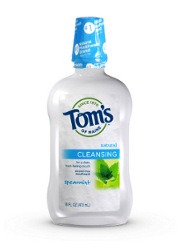Tom’s of Maine is studying the viability of using non-GMO potatoes that would otherwise be tossed in the garbage as a feedstock for biodegradable packaging.
Potato starch can be used to form polylactic acid (PLA), a plastic resin that could be used to make mouthwash bottles or deodorant canisters — two of the products initially targeted under the personal care product company’s initiative.
The research is being done in partnership with the University of Maine and the Sustainable Bioplastics Council of Maine, which are seeking ways to use local agricultural waste.
Potatoes are the biggest commodity in the state’s $1.2 billion a year agricultural industry. The ones that Tom’s of Maine proposes using would normally be destined for landfills.
“One interesting finding from our research is that for the initial plant we don’t need to take potatoes away from use as food to meet the needs for bio-plastic production,” says Kate Dickerson, a researcher with the University of Maine.

Two years ago, Tom’s of Maine eliminated aluminum toothpaste tubes in favor of laminate, which is lighter, less-energy intensive and cuts steps out of the manufacturing process. At least 40% of the materials used in its packaging is sourced from recycled materials.
Other companies are experimenting with ways to turn plants into plastics, but most tend to use corn (which is 90% GMO in the US).
Exceptions are Coca-Cola‘s PlantBottle, which is made from sugarcane grown in Brazil. Other PLA feedstocks include wood, waste paper products, sugar, grasses and grains.
PepsiCo has considered more radical uses for potato waste, such as churning it up into compostable packaging for its UK snack brand, Walkers. Elsewhere, champagne company Veuve Clicquot is using paper made partially from potato starch to keep its bottles cool.
